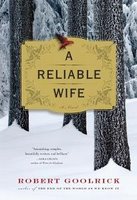Today's blog is written by the terrific trio of Sonja Somerville, Robin Beerbower and Elizabeth Hughes of the Salem Public Library in Salem, Oregon. They've teamed up to offer their thoughts on Robert Goolrick's A Reliable Wife --- and share some of the questions that kept them talking about this gripping debut novel. We wanted to give readers some advance notice about A Reliable Wife --- which is on sale April 7th --- so there's plenty of time to add it to your book club line-up.
We're excited to announce that Sonja, Robin and Elizabeth will be blogging here at ReadingGroupGuides.com on a regular basis. Look for their next post in May. Robert Goolrick did something tremendous when he created the snow-stricken Wisconsin landscape that is home to The Reliable Wife. This first novel from the author of the memoir The End of the World as We Know It is completely gripping. It engages from the first lines, which describe wealthy small-town magnate Ralph Truitt as he stands waiting, surrounded by the whispers of his neighbors, for a woman to arrive by train. The woman, Catherine, is someone he has ordered up by placing an ad, seeking a "reliable wife." He implies that he simply wants a steady companion after years of loneliness. She accepts, implying that she's a plain woman ready to accept the job. Since they're both lying elaborately, it's quickly clear their relationship will be a good deal more complicated than initially advertised.
Robert Goolrick did something tremendous when he created the snow-stricken Wisconsin landscape that is home to The Reliable Wife. This first novel from the author of the memoir The End of the World as We Know It is completely gripping. It engages from the first lines, which describe wealthy small-town magnate Ralph Truitt as he stands waiting, surrounded by the whispers of his neighbors, for a woman to arrive by train. The woman, Catherine, is someone he has ordered up by placing an ad, seeking a "reliable wife." He implies that he simply wants a steady companion after years of loneliness. She accepts, implying that she's a plain woman ready to accept the job. Since they're both lying elaborately, it's quickly clear their relationship will be a good deal more complicated than initially advertised.
Catherine has a checkered past. Ralph has a cartload of emotional baggage, including a catastrophically terrible first marriage. Ralph's real intention is to force Catherine to look for his estranged (and strange) son. Catherine's real intention is to kill her new husband and become a rich widow.
With a set-up like that, you've got to keep reading.
The writing style has echoes of Kent Haruf's stark approach. Goolrick's prose offers a simple account of what characters are doing, what they see, what they say, what they remember. He lets the reader work out what it all means. The reader is left to work through and experience the events along with the characters, which only adds to the growing sense of distress.
At the same time, the story is incredibly complicated, and around every corner are new revelations, each more twisted than the last. And just as you begin to suspect that you've grasped all the ways in which this coupling is wrong, another layer of the onion peels away and you realize you had no idea how wrong it could be. These are not healthy people. The fact is skillfully underscored by a constant thread in the novel of Ralph's fascination with the effects of the deep Wisconsin winters on the psyches of his neighbors, many of whom go barking mad from the isolation and cold and endless white.
It's great stuff, made greater by the plentiful fodder it offers for people like us who love to talk about our books. Some of the questions that kept us talking were:
- Were there any truly likeable characters? How does the reader's perception of the characters and their motivations change as the book moves forward? What role do the supporting characters play in shaping your opinion and understanding of Ralph and Catherine?
- Ralph Truitt is a powerful man in his community. Why does he seem to hand over so much power in his relationship with his two wives? Why would he let them do the things they do to him? Does he have a power role in either relationship?
- Personal history helps explain the appalling behavior of characters in the book, but do the preceding events actually justify anyone's actions?
- Sex is such an ever-present theme, it's almost another character in the book. How does sex or the idea of sex affect the story?
- What role do the recurring stories of winter-time madness and violence play in the theme and the plot of the book?
- Why is the backdrop of a Wisconsin winter so important?
- Does Goolrick's somewhat restrained writing style make the events more or less horrifying?
---Sonja Somerville, Robin Beerbower, and Elizabeth Hughes
Salem Public Library
Salem, OR
Blog
March 9, 2009
Librarians' View: Robert Goolrick's A RELIABLE WIFE
Comments

